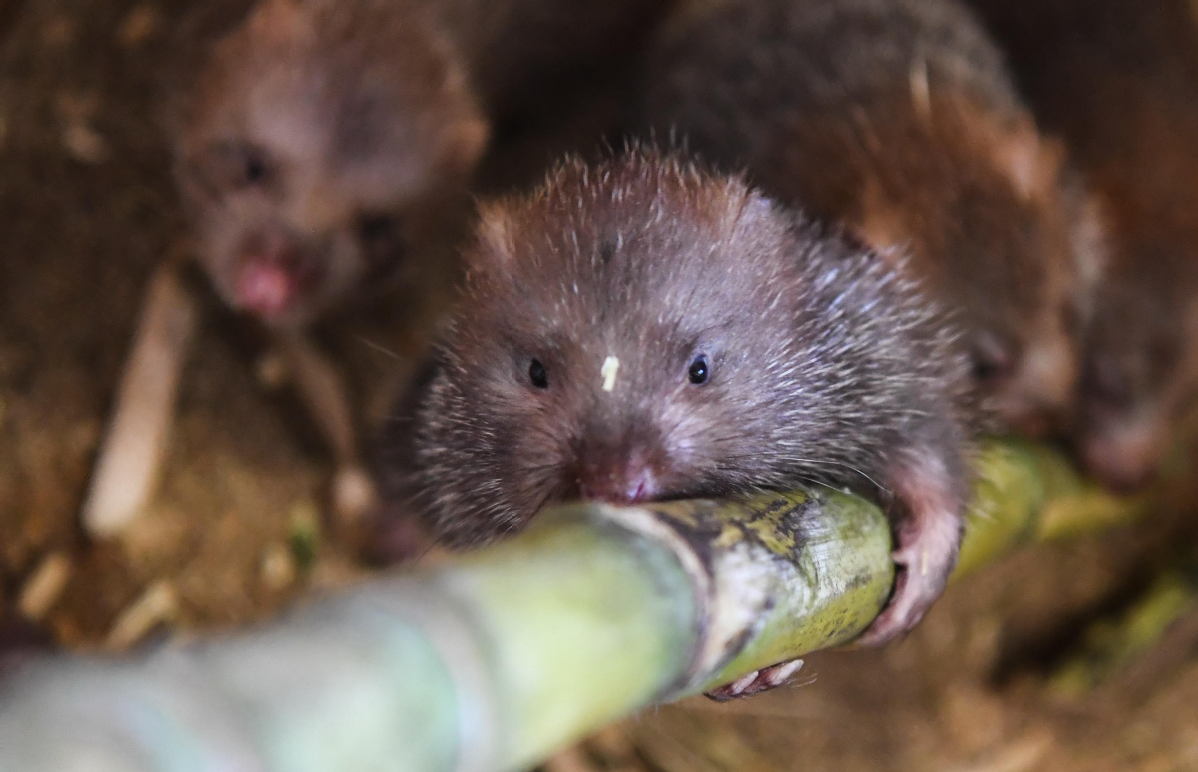Virus, ban double slap for China rat farmers

A bamboo rat. [Photo/Xinhua]
BEIJING — Bamboo rat breeder Zheng Yanqing said his heart aches every time he inspects his farm, where more than 3,000 bamboo rats clamor for food.
The travel restrictions triggered by the novel coronavirus outbreak have already severed food supplies, and a new ban on the wildlife trade has disrupted the business boom straddling the Chinese Lunar New Year.
“The rodent multiplies fast, and we’re running out of food supplies and space,” said Zheng, director of a bamboo rat cooperative in Shangrao, Jiangxi province.
“Almost 70 bamboo rat farmers in the neighborhood rely on us for sales, and many of them are registered poor families,” he added.
Farming bamboo rats was seen as a way to help poor farmers out of poverty in southern provinces that abound in bamboo and sugar cane-the rodents’ staple. But now, many breeders risk losing money as all wildlife consumption is banned.
Unfortunately, according to Zhong Nanshan, a prominent scientist who heads a government-appointed panel of experts to help control the epidemic, the bamboo rat could be one of the intermediary hosts of the new virus.
Since January, authorities have shut down hundreds of thousands of restaurants selling wild meat. The National Forestry and Grassland Administration said about 2,800 bamboo rat and badger breeders have been sealed off indefinitely.
On Feb 24, more than a month after trading was suspended, the Standing Committee of the National People’s Congress-the top legislature-passed a resolution to ban the trade and consumption of wildlife. To reduce the impact on tens of thousands of breeders of animals such as bamboo rats, frogs and turtles, the resolution has asked relevant authorities to create a “white list” for edible species, leaving room to exempt certain species. It also pledged to compensate breeders affected by the banned list and help them shift to other businesses.
With the exemptions yet to come, Zheng said: “I think it is OK that the government wants us to shift to other businesses, but all I can do now is wait, which has cost me dearly.”
With trade suspended indefinitely, the director said, he is obliged to expand his farm and keep supplying food as new bamboo rats are born. If not, he would have to watch them die in overcrowded dens. Some smaller breeders have opted to starve the stock to minimize losses.
Bamboo rat boom
Farmers Liu Suliang and Hu Yueqing-known as the “Chinese Farm Brothers”-were among many online influencers who propelled the rodent to fame by vlogging their routine life at a farm in Ganzhou, Jiangxi.
The pair was known for making short videos in which Liu doted on the roundish bamboo-gnawers before finding various excuses for slaughtering them off screen and turning them into grilled or stewed delicacies. The amusing videos even prompted netizens to post on Sina Weibo under the hashtag “A Hundred Reasons to Eat Bamboo Rats”, which has 160 million views.
As a novel internet sensation, the bamboo rat is the focal point of a sprawling network of rural breeders, e-commerce vendors and streetside eateries, who have been marketing the meat as a skin care food that could be used to enhance beauty.
The rodent has up to four litters a year, and their newborns can grow from 10 grams to 2 kilograms in six months, making them an ideal species to breed in rural mountain areas in South China, where some farms of pigs, cows and other large animals have failed to pick up due to inadequate water supply and huge initial input.
Therefore, it is viewed by local authorities as an alternative to the more popular poverty-relief projects, such as growing herbal medicines or running embroidery workshops.
Yu Aizhi, a professor at Central University of Finance and Economics who specializes in rural economy, said the top priority now is the white list for exempted species and making sure farmers are compensated.
“A clear-cut white list is the speediest approach to reduce farmers’ losses. It helps prevent some local governments from rolling out ultra-strict bans,” she said.
Yu said that in the long run, efforts should be made to educate the public about wildlife consumption to reduce market demand. “The nutrients offered by rare wildlife are not much different from those in an egg.”
Gan Yuanchun, an adviser with the Hunan Cuisine Industry Promotion Committee, a nonprofit group in Hunan province, advised against banning domesticated bamboo rats altogether, as it could prompt poachers to target wild relatives.
“To protect the wild species, I think more efforts should be made to tighten management over breeders.”
Yu echoed the opinion, suggesting that technologies including block chain could be employed to trace origins of the animals, which would help reduce illegal wildlife trade.
For more news about the novel coronavirus click here.
What you need to know about Coronavirus.
For more information on COVID-19, call the DOH Hotline: (02) 86517800 local 1149/1150.
The Inquirer Foundation supports our healthcare frontliners and is still accepting cash donations to be deposited at Banco de Oro (BDO) current account #007960018860 or donate through PayMaya using this link.